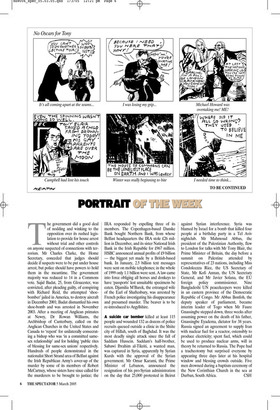PORTRAIT OF THE WEEK T he government did a good deal
of nodding and winking to the opposition over its rushed legislation to provide for house arrest without trial and other controls on anyone suspected of connections with terrorism. Mr Charles Clarke, the Home Secretary, conceded that judges should decide if suspects were to be put under house arrest, but police should have powers to hold them in the meantime. The government majority was reduced to 14 in a Commons vote. Sajid Badat, 25, from Gloucester, was convicted, after pleading guilty, of conspiring with Richard Reid, the attempted ‘shoebomber’ jailed in America, to destroy aircraft in December 2001; Badat dismantled his own shoe-bomb and was arrested in November 2003. After a meeting of Anglican primates at Newry, Dr Rowan Williams, the Archbishop of Canterbury, called on the Anglican Churches in the United States and Canada to ‘repent’ for unilaterally consecrating a bishop who was ‘in a committed samesex relationship’ and for holding ‘public rites of blessing for same-sex unions’ respectively. Hundreds of people demonstrated in the nationalist Short Strand area of Belfast against the Irish Republican Army’s cover-up of the murder by some of its members of Robert McCartney, whose sisters have since called for the murderers to be brought to justice; the IRA responded by expelling three of its members. The Copenhagen-based Danske Bank bought Northern Bank, from whose Belfast headquarters the IRA stole £26 million in December, and its sister National Irish Bank in the Irish Republic for £967 million. HSBC announced annual profits of £9 billion — the biggest yet made by a British-based bank. In January, 2.5 billion text messages were sent on mobile telephones; in the whole of 1999 only 1.1 billion were sent. A law came into force obliging all horses and donkeys to have ‘passports’ lest unsuitable specimens be eaten. Djamilia M’Barek, the estranged wife of the Earl of Shaftesbury, was arrested by French police investigating his disappearance and presumed murder. The beaver is to be re-introduced to Argyllshire.
A suicide car bomber killed at least 115 people and wounded 132 as dozens of police recruits queued outside a clinic in the Shiite city of Hillah, south of Baghdad. It was the most deadly single attack since the fall of Saddam Hussein. Saddam’s half-brother, Sabawi Ibrahim al-Tikriti, a wanted man, was captured in Syria, apparently by Syrian Kurds with the approval of the Syrian government. Mr Omar Karami, the Prime Minister of Lebanon, announced the resignation of his pro-Syrian administration on the day that 25,000 protested in Beirut against Syrian interference. Syria was blamed by Israel for a bomb that killed four people at a birthday party in a Tel Aviv nightclub. Mr Mahmoud Abbas, the president of the Palestinian Authority, flew to London for talks with Mr Tony Blair, the Prime Minister of Britain, the day before a summit on Palestine attended by representatives of 23 nations, including Miss Condoleezza Rice, the US Secretary of State, Mr Kofi Annan, the UN Secretary General, and Mr Javier Solana, the EU foreign policy commissioner. Nine Bangladeshi UN peacekeepers were killed in an eastern province of the Democratic Republic of Congo. Mr Abbas Bonfoh, the deputy speaker of parliament, became interim leader of Togo when Mr Faure Gnassingbe stepped down, three weeks after assuming power on the death of his father, Gnassingbe Eyadema, dictator for 38 years. Russia signed an agreement to supply Iran with nuclear fuel for a reactor, ostensibly to produce electricity; spent fuel, which could be used to produce nuclear arms, will in theory be returned to Russia. The Pope had a tracheotomy but surprised everyone by appearing three days later at his hospital window and blessing crowds outside. Five men drowned during a baptism ceremony of the New Corinthian Church in the sea at Durban, South Africa. CSH


























































 Previous page
Previous page